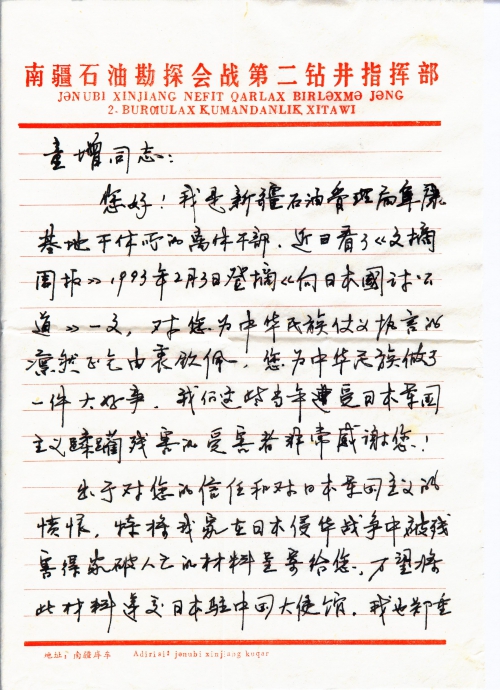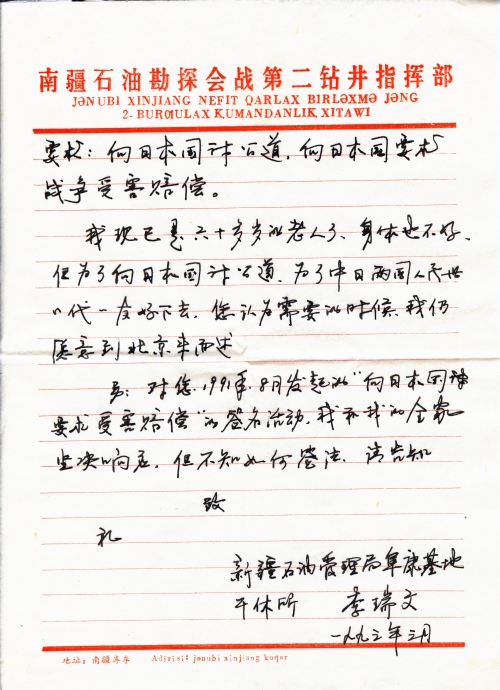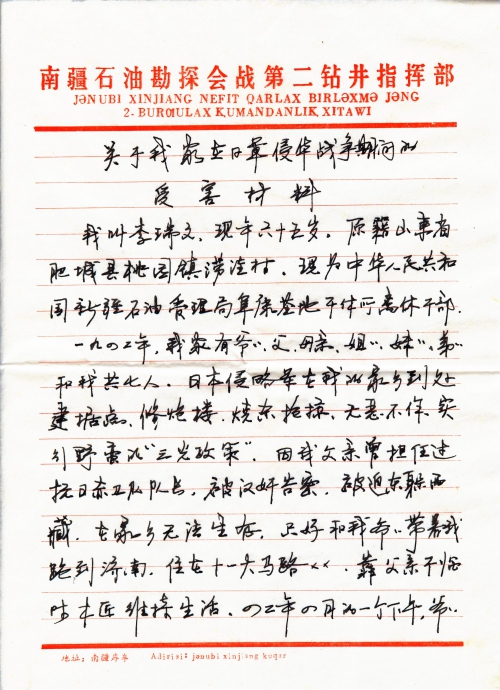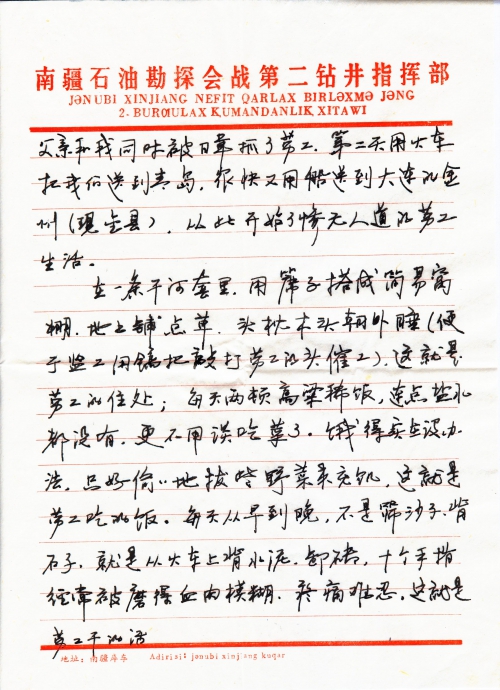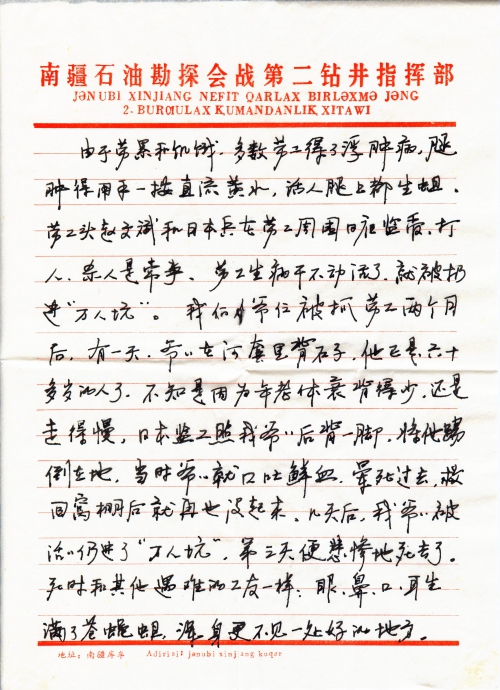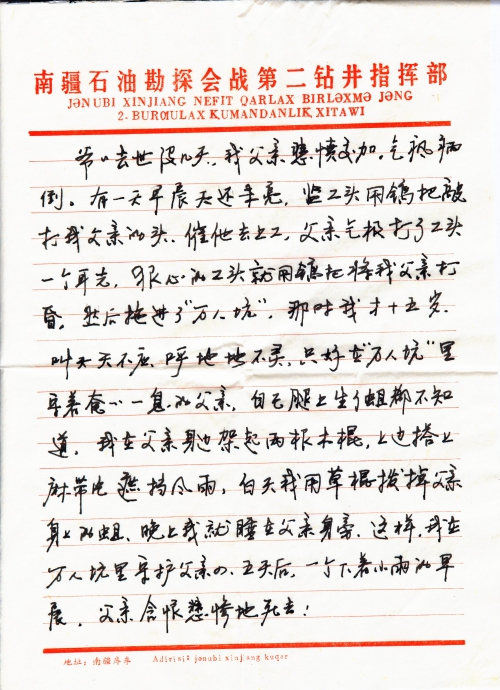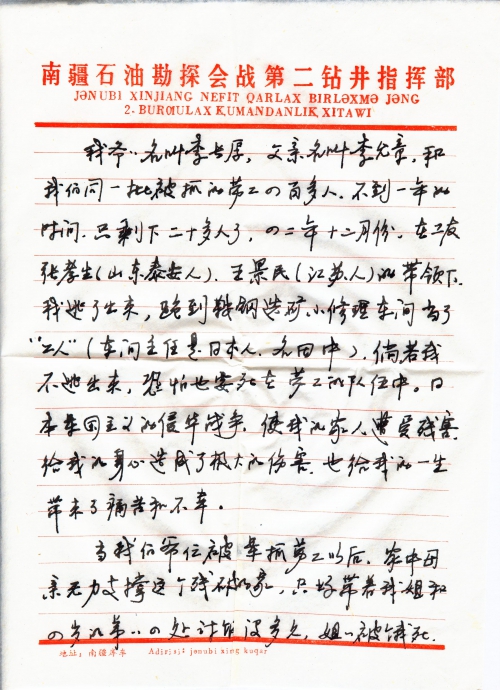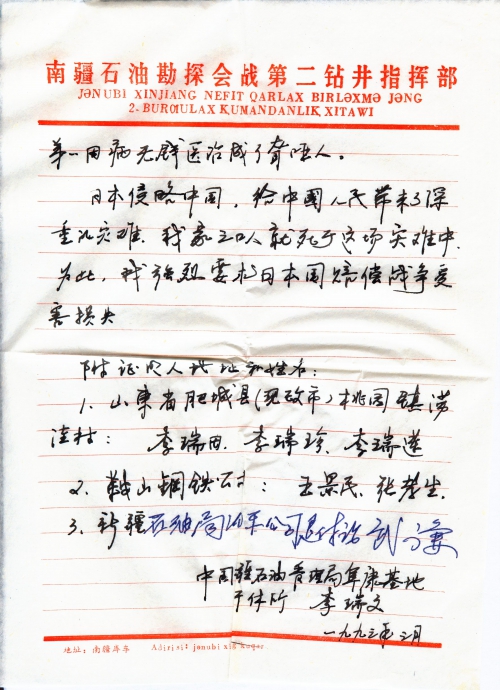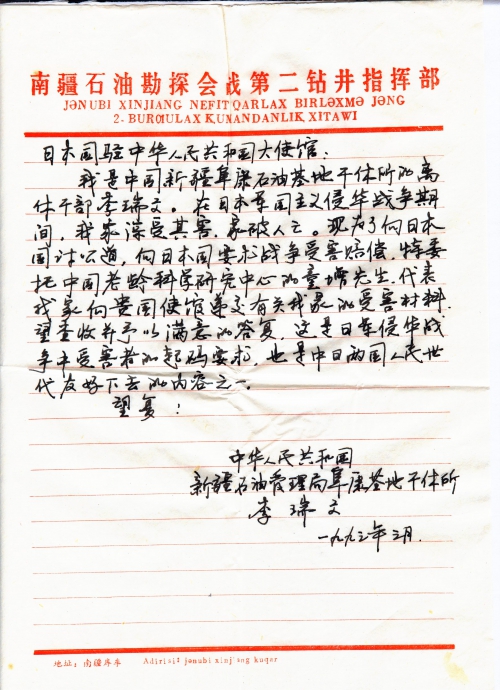Date of Letter:1993-03
Address of Author:Xinjiang Uygur Autonomous Region
Date of Event:1942
Location of Event:Feicheng County, Feicheng City, Shandong Province
Name of Author:Li Ruiwen
Name(s) of victim(s):More than 200 people including Li Ruiwen, Li Yuntong and Li Changhou
Type of atrocity:Slave Laborers, Other Massacres(SL, OM)
Other Details:In 1942, two hundred people including Li Ruiwen and his father Li Yuntong and grandfather Li Changhou were conscripted laborers. Whenever the Slave Laborers were too tired to move on, they were thrown into a “massacre pit”, including Li Yuntong and Li Changhou. Only twenty or so Slave Laborers were left in less than a year.
Comrade Tong Zeng:
Hello!
I am a retired cadre at the Sanatorium for Retired Cadre of the Xinjiang Petroleum Administration Bureau Fukang Base. Recently I read an article “Demanding Justice from Japan” published by the “Weekly Digest” on February 3, 1993. I sincerely admire your awe-inspiring righteousness to speak out for the Chinese people; you have done an extraordinarily good deed for the Chinese people. We victims who were ravaged and cruelly injured by Japanese Militarism many years ago really appreciate you!
Because of our trust in you and hatred toward Japanese Militarism, I hereby mail to you the materials about how my family was broken up and decimated in the Japanese War of Invasion of China. I earnestly wish that you will submit this material to the Japanese embassy in China. I also solemnly demand: seek justice from Japan, and demand war reparations from Japan.
I am now a senior over sixty years old, and not in good health. But in order to seek justice from Japan, for the sake of sustaining a long standing friendship for generations to come between the Chinese and Japanese peoples, I am still willing to go to Beijing to talk to you face-to-face, when you think it is necessary.
PS: As for the “Demanding Compensation for Damage and Injuries from Japan” signature campaign that you initiated in August 1991, my whole family and I resolutely support this campaign, but we do not know how to provide our signatures. Please tell us
Regards
Yours faithfully
Li Ruiwen
Sanatorium for Retired Cadre
Xinjiang Petroleum Administration Bureau Fukang Base
March 1993
Summary of My Family’s Suffering during the Period of Japanese Military Invasion of China
I am Li Ruiwen, 65, my native place is Laowa Village, Taoyuan Town, Feicheng County, Shandong Province. I’m a retired cadre at the Xinjiang Petroleum Administration Bureau Fukang Base Sanatorium for Retired Cadre, the People’s Republic of China.
In 1942, my family had seven members including grandpa, father, mother, elder sister, younger sister, younger brother and I. The Japanese invasion army built outposts, gun turrets, they burned, killed and looted wherever they went, and committed all sorts of crimes everywhere in my hometown. They implemented the barbaric “Burn All, Kill All, Loot All” Policy. As my father once served as team leader of the Anti-Japanese Red Guards, he was tipped off by traitors, and was compelled to hide away from our hometown. My father, my grandpa and I fled to Jinan, and lived at XX Shiyi Thoroughfare. My father worked as a temporary carpenter to make a living. One afternoon in April 1942, my grandpa, father and I were simultaneously conscripted by the Japanese army as slave laborers. The next day they sent us to Qingdao by train, and soon to Jinzhou in Dalian (now Jinxian County) by ship, which began our brutal and inhuman life as slave laborers.
In a dried river bend, inside simple sheds constructed with mats, with some grass laid on the ground, we slept on blocks of wood as pillow with the head pointing outside (thus easy for the overseer to knock our heads with the hoe handle to wake us up to work), and this was the laborers’ residence. We had two meals of sorghum porridge each day, without even some salt, not to mention dish. When we were too hungry, we would secretly pluck some wild vegetables to ease the hunger, this was the laborers’ meals. Each day from dawn to dusk, we either sifted sand, carried pebbles, or carried cement and unloaded bricks from trains. Often our ten fingers were damaged so badly that they bled continuously, with intolerable pain. This was our life as slave laborers.
Owing to fatigue and hunger, most of the laborers contracted dropsy, their legs were so swollen that yellow pus would seep out if pressed with fingers, maggot could be found on even the legs of living persons. The overseer Zhao Wenbin and Japanese soldiers guarded the laborers day and night, beating and killing were common incidents. When laborers were ill and unable to work, they would be tossed into the “Mass Grave”. Two months after we three were conscripted as laborer, one day, my grandpa was carrying pebbles in the river bend. As he was already over sixty, perhaps it was because he was carrying a lighter load due to weakness and old age, or because of his slowness in movement, the Japanese overseer kicked my grandpa in the back, and he collapsed on the ground. He was bleeding out of his mouth, and he fainted on the spot. After we carried him to the shed, he never rose again. Several days later, my grandpa was thrown into the “Mass Grave” still alive. On the third day he passed away miserably. When he died he was like other dead work mates, the eyes, nose, mouth and ears were infested with maggots, not one spot on the body was free of wound or injury.
Only a few days after my grandpa passed away, my father fell ill due to grief and anger. One morning before the sun rose, the overseer knocked my father’s head with hoe handle, and urged him to work. My father was so indignant that he slapped the overseer’s face, the cruel overseer used hoe to knock my father unconscious, then pushed him into the “Mass Grave”. I was only 15 at the time; there was no one to turn to for saving my father. I could only guard my barely breathing father in the “Mass Grave”, unaware of the grubs on my own legs. I put up two wooden sticks above my father, and topped them with hemp bag pieces to provide shelter. During the day I used grass stick to drive away the maggots on my father’s body, in the night I slept beside my father. As I guarded my father in the Mass Grave for 4 to 5 days in this way; in a rainy morning, my father passed away miserably with bitter hatred!
My grandfather is named Li Changhou, my father is named Li Yunzhang. There were more than 400 persons who were captured together with us. But in less than one year time, only 20 or so were left. In December 1942, led by work mate Zhang Xiaosheng (native of Shandong Taian), and Wang Jingmin (native of Jiangsu), I escaped, and arrived at Anshan Iron & Steel Ore-dressing Repair Workshop as “worker” (the head of workshop is a Japanese named Tanaka). If I didn’t escape, probably I would also die there among the laborers. The war waged by the Japanese Imperialism ruined my whole family, and brought tremendous damage to both my mind and body, it also inflicted anguish and misfortune to the rest of my life.
After my grandpa, my father and I were captured as laborer, my mother at home was unable to support this destroyed home, and had to beg for food along with my elder sister and 4-year old younger brother. Soon my elder sister starved to death, my younger brother became deaf as we had no money for his medical treatment.
Japan’s invasion into China brought massive calamity to the Chinese people, three of my family died in this disaster. For this reason, I strongly demand the Japanese government to compensate for war damage.
Please find attached the addresses and names of the references:
1. Laowa Village, Taoyuan Town, Feicheng County (now city), Shandong Province: Li Ruitian, Li Ruizhen, Li Ruilian
2. Anshan Iron & Steel Company: Wang Jingmin, Zhang Xiaosheng.
3. Xinjiang Petroleum Bureau Siping Company: Retiree Lun Wuxian
Li Ruiwen
Sanatorium for Retired Cadre
China Xinjiang Petroleum Administration Bureau Fukang Base
March 1993
Japanese Embassy in the People’s Republic of China:
I am Li Ruiwen, a retired cadre at the Sanatorium for Retired Cadre of China Xinjiang Fukang Petroleum Base. During the period of invasion of China by Japanese Militarism, my family suffered death and destruction. Now, in order to demand justice from Japan, and demand compensation for damage and suffering in the war from Japan, I hereby entrust Mr. Tong Zeng of the China Research Center on Aging to submit my family’s material on our family’s suffering and damage to your embassy on behalf of my family. I wish that you will accept it and give me a satisfactory reply. This is the minimum requirement demanded by a victim of the Japanese War of Invasion into China, and also one of the contents in the effort to develop long standing friendship for generations to come between the Chinese and Japanese peoples.
Looking forward to your reply!
Li Ruiwen
Sanatorium for Retired Cadre
Xinjiang Petroleum Administration Bureau Fukang Base
The People’s Republic of China
March 1993















